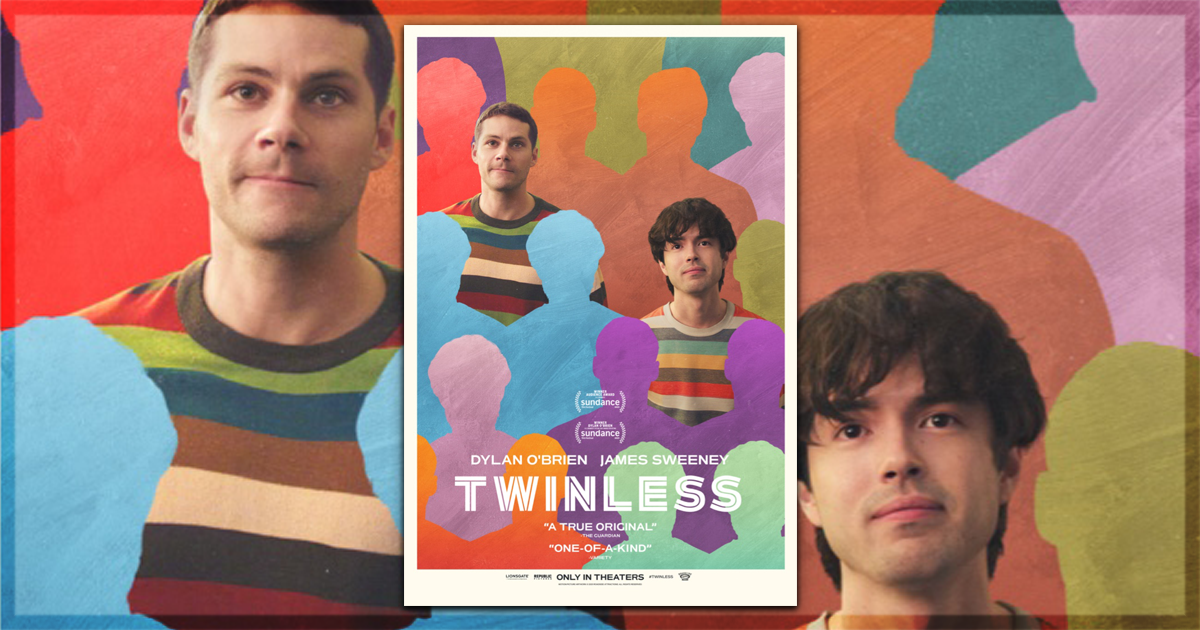I wasn’t familiar with the work of James Sweeney (Straight Up), but there’s always something fascinating when a filmmaker decides to take on so many roles in a single project: writing, directing, producing, and, on top of that, playing one of the main characters. That kind of total exposure naturally sparks immense curiosity, especially when the cast also includes Dylan O’Brien (Maze Runner) and Aisling Franciosi (The Nightingale). What more could I ask for?
In Twinless, Sweeney brings Dennis to life, a young man who, like Roman (O’Brien), has lost his twin brother. The two meet at a support group for grieving twins and quickly develop an unusual friendship, marked by both tender moments and a growing dynamic of substitution as the story progresses. Marcie (Franciosi), the ever-sweet and accommodating receptionist, enters as an external element to the protagonists’ shared bubble of grief, offering a counterpoint of normality and hope, even if she doesn’t really possess an arc like the others.
The first spotlight naturally falls on O’Brien. It’s astonishing how he continues to be such an underappreciated actor in Hollywood – shocking that he’s not the current lead of a major franchise – when he demonstrates remarkable versatility here. His comedic lines even recall Liam Neeson in the recent The Naked Gun, that slapstick comedy where a character misinterprets obvious situations, drawing genuine laughs from the absurdity of the scene. Yet O’Brien goes far beyond basic humor: he can sustain monologues of profound emotional weight, conveying the incomparable pain of losing a brother, questioning his own identity, and exposing intimate vulnerabilities. This ability to oscillate between laughter and melancholy makes his performance memorable, ranking among the best work of his career.
Even in a more minor role, Franciosi finds the perfect tone in Twinless. Marcie is a simple, good-hearted woman who longs to give love and care to someone. It may seem like a banal part, but Franciosi infuses it with humanity and authenticity, serving as an emotional anchor in a story where everything else is instability and loss. Sweeney himself proves competent as Dennis, embodying the shyness and insecurity of someone who simply wants to be accepted. I can’t reveal too much about the character arc without spoiling key plot points, but it’s enough to say that some of the narrative’s most tragic revelations are tied to him, heightening the narrative’s dramatic impact.
However solid his acting may be, I was even more impressed by Sweeney behind the camera. His collaboration with cinematographer Greg Cotten shows an outstanding command of cinematic language. From the decision to hold shots on actors’ faces – allowing them to work through emotions in real time – to creative visual transitions like split-screen compositions, there’s a freshness and boldness to every scene that immediately captures our attention. One sequence, where the screen splits in two, overlaying different moments in a single visual flow, is particularly stunning. Editor Nikola Boyanov’s work complements the filmmaker’s imagination, maintaining rhythm while allowing for the necessary pauses so that the emotions never get lost.
Perhaps the most surprising aspect, though, is the balance between humor and darker themes. I rarely felt any dissonance: jokes and comic observations flow naturally without undermining the gravity of the subjects being addressed. Twinless manages to address grief, loneliness, friendship, love, fear, regret, and much more with unusual delicacy, exploring all these dimensions through a genuinely human lens. It never falls into easy sentimentality, nor does it retreat into cold detachment. Life, here, is shown as it is: ridiculous in one moment, devastating in the next.
It’s precisely this refusal to simplify the experience of grief that sets Twinless apart from so many other stories about loss. The movie doesn’t seek to offer its protagonists a miraculous cure or guide them toward a redemptive ending. On the contrary, it accepts instability as an inevitable part of the process, allowing the audience to feel the oscillations between humor, tenderness, and tragedy. Roman doesn’t merely mourn the death of his brother, Rocky; he attempts to rebuild an identity that has lost half of its reflection. Dennis isn’t just a companion in misfortune, but also a manifestation of the risk of projecting onto another what no longer exists. Their relationship is simultaneously an act of survival and a potential path to self-destruction.
Marcie’s role reinforces this tension. Appearing as someone who belongs to the “real world”, she serves as a reminder that life goes on, that it’s possible to form bonds based on truth and reciprocity, not just substitution. Yet her presence exposes the fragility of a friendship built on pain, showing that attempts to replicate a lost connection can never be entirely authentic.
Finally, the choice to make O’Brien play both Roman and Rocky deepens Twinless‘ central themes even further. It’s impossible not to feel that Roman lives in constant comparison to his brother’s absence, desperately seeking to fill that void through his relationship with Dennis. The duality of presence/absence mirrors perfectly the sense of incompleteness that permeates the entire film, emphasizing that grief is rarely only about the person who’s gone, but also about the version of ourselves that disappears with them.
Final Thoughts on Twinless
Twinless is unafraid to explore the most ambiguous zones of suffering, transforming pain into striking, inspiring cinema. James Sweeney demonstrates a distinct authorial voice, Dylan O’Brien delivers one of the best performances of his career, and the result is a powerful reflection on identity, memory, and survival. It’s one of those rare movies that remind us the true mystery of grief isn’t in resolving it, but in learning to live with it – whispering, at times shouting, that it’s not about closure, but about discovery.
Rating: A-
Twinless is now playing in theaters.
Learn more about the film, including how to buy tickets, at the official website for the title.


